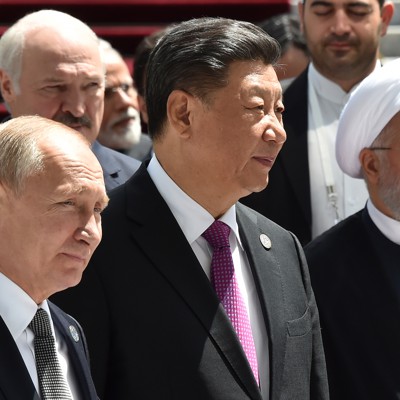Issued in time for 2024 global security forumof which Defense One is a media partner.
China is certainly monitoring Russia and Iran’s use of non-state actors to pursue their strategic goals in places like Ukraine and Gaza. What lessons has the Chinese government drawn and how can we apply them?
The Kremlin has cultivated a variety of non-state actors that do its bidding. In Ukraine, Russia released the Wagner Group, a private military company involved in some of the bloodiest battles of the war. The group, since renamed the African Corps, has also been deployed to help military regimes “fail coups” across sub-Saharan Africa. In the online world, the Kremlin has used troll farms such as the Internet Research Agency to sway elections and undermine foreign support for Kiev.
Meanwhile, the Iranian government has used the Islamic Revolutionary Guard Corps’ Quds Force to cultivate and support an extensive network of militias and political factions across the Middle East, the so-called “Axis of Resistance,” including Lebanon’s Hezbollah and the Houthis. is providing funding. movement in Yemen, and various Shiite militias in Iraq and Syria. Iran supplies these proxy forces with advanced weapons and provides them with on-the-job training in how to use drones, missiles, and other cutting-edge technology. In return, Hezbollah rocket attacks distract the Israel Defense Forces from focusing solely on fighting in Gaza, while Houthis’ persistent attacks on commercial ships threaten to slow the regional economy and trigger global repercussions.
Russia and Iran’s use of non-state actors has reduced international backlash in pursuing their geopolitical goals, but the proxy model also has risks. In June last year, mercenaries directly threatened the Kremlin during an attempted rebellion by Wagner’s longtime leader Evgeny Prigozhin. Then, in late January, an attack by the Shiite militia Kataib Hezbollah killed three U.S. soldiers in Jordan and injured dozens more. The attack nearly sparked a wider conflagration before Iran intervened to put pressure on the proxy group.
One lesson China has probably learned is that allowing private military contractors and agents to become too powerful or autonomous can be dangerous.
Since the 2010s, China has encouraged a growing industry of private military contractors to protect China’s burgeoning interests abroad, particularly its growing Belt and Road projects. Chinese PMCs are different from Russian and Iranian PMCs. By law, Chinese PMCs must be majority-owned by the government and most are unarmed. These contractors are used to provide capacity building, security consulting, intelligence, and equipment to local security partners. They also protect and in some cases rescue Chinese nationals from conflict zones.
It is recognized that additional security is needed to protect Belt and Road infrastructure and personnel, and peacekeeping forces are unlikely to be able to meet this need. In March, seven Chinese nationals were killed in a terrorist attack in Pakistan. At the same time, the Chinese government is image-conscious and wants to avoid being labeled as a “new colonial power,” and there is a possibility that regular Chinese troops will be stationed abroad to provide security. is low. PMCs could play that role, but Chinese leader Xi Jinping and members of the Chinese Communist Party’s Politburo are likely aware of the risks and benefits.
The fact that China’s current private military and security contractors must be primarily state-owned indicates the Chinese government’s concern about creating organizations that may one day fall into corrupt practices. At least in the short term, the Chinese Communist Party is unlikely to cultivate, support, or deploy autonomous non-state actors like the Wagner PMC.
But there are also aspects of the Iranian model that could be attractive to Beijing. It incorporates military advisers into non-state actors in a manner similar to the way Iran’s Revolutionary Guards operate, seeking political influence in the countries in which they operate.
There are also examples of Russia’s “little green people” who helped Russia control Crimea. Initial confusion about who these forces were meant that the United States and its NATO allies were slow to develop a response plan. By the time Washington, London and Brussels realized what was happening, it was too late.of this type Fait accompli A possible scenario involving Taiwan could be an action China would consider.
The United States needs to gain a deeper understanding of how China views proxies and PMCs and how Beijing may seek to use them in the future. Otherwise, you risk not being ready. The United States suffered a blunder before responding to the Wagner Group. When it comes to China, the stakes are even higher.
Molly Saltskog is a research associate at the Soufan Center.
Dr. Colin P. Clark is Director of Research at the Soufan Group and Senior Research Fellow at the Soufan Center.

